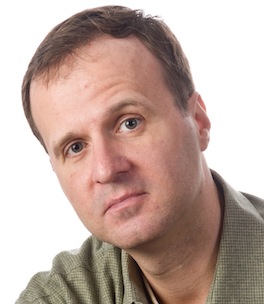Special to WorldTribune.com, October 27, 2021

Corporate WATCH
Commentary by Joe Schaeffer
Americans have recently been horrified to learn the shocking details of the gruesome torture of beagles for “medical research” funded by a National Institutes of Health (NIH) division led by Dr. Anthony Fauci, Joe Biden’s chief medical adviser.
The massive outrage is a bit disheartening, actually, considering Fauci’s long-time avid championing of fetal tissue harvesting, which has resulted in truly barbaric “research” procedures at federally-funded labs across the country, with the University of Pittsburgh standing out as one of the very worst offenders. Why did it take beagles to get everybody’s attention?
And the shoes keep dropping. Now we are learning that Fauci green-lighted drug trial experiments on hundreds of AIDS orphans in New York City.

None of this should come as a surprise when one looks into this man’s background. Anthony Fauci is a humanist and a fervent devotee of that secular religion’s belief in utilitarianism, which always ends up with the powerful treating the powerless as material fodder to be exploited for its own gain.
Fauci has shown this side of himself with beagles and babies, both born and unborn. Why would he stop there?
As more and more evidence of the frightful health effects of the rushed, gene-experimental coronavirus vaccine comes to light, Americans may soon be confronted with a devastating thought: Everyone who got the jab is a Fauci Puppy.
The philosophy behind this “bioethic” has always been a part of the vaccine mandate regime. Ezekiel Emanuel, who served as a COVID adviser for Biden, wrote this 12 years ago (bold added throughout this column):
Because the enterprise of biomedical research produces the important benefit of medical knowledge that is an advantage to us all, we all have an obligation to support that system of knowledge generation by participating in biomedical research. If it turned out that biomedical research with human subjects was not that important after all – that society would not be much worse off if all research on humans were to cease – then there would be no obligation to participate. But barring convincing evidence that such research is in fact unimportant, there is a duty to participate in research.
“The Obligation to Participate in Biomedical Research” is the deeply disturbing title of this treatise.
At times, the paper very carefully pretends to be merely offering up various highly coercive discussion points on the topic, even dismissing some, hoping the reader never hits on the higher point that none of this should even be up for debate in the first place.
It’s not hard to see where this road leads: forced medical research on formerly free citizens:
Just as many claim that citizens have an obligation to vote even though they are not legally required to do so, society should come to recognize that everyone has an obligation to participate in research when it is not excessively burdensome to do so. The current default position is “you don’t have to participate in research if you don’t want to.” Instead, the default should be: “you should participate unless you have good reasons not to.” We advocate a cultural and moral change, not a legal one.
It would not appear that these views have changed in the passing years. Here’s Zeke Emanuel talking to NPR in September, as autumn began and the vaccine mandate machinery started to hum:
This notion that freedom allows me to do whatever I want is something our Founding Fathers would totally reject. That is not their understanding of freedom. Freedom is ordered liberty. And part of ordered liberty is where we impact other people, like infectious diseases, we have to actually all act together. And they would think this is perfectly consistent with freedom.
And I think the president and most of the American population agrees with that. There’s going to be a small group that doesn’t. And that’s the people who we actually need to abide by this mandate.
Emanuel’s 2009 co-author Alan Wertheimer, a now-deceased researcher at the NIH’s Orwellian-named Department of Bioethics and a former Harvard visiting professor, was even more blunt, according to his former colleague Elisa Hurley, Executive Director of Public Responsibility in Medicine and Research, a bioethics organization. In a blog post mourning his 2015 passing she writes:
Ever the scholar and truth-seeker, Alan never hesitated to let me know — collegially, of course — if he disagreed with something I said. For instance, he wrote me a note about my Ampersand post on informed consent last year, and in it, reminded me that it’s actually a matter of controversy within the bioethics community whether lack of comprehension on the part of a potential research subject invalidates that person’s informed consent….
But as I was reflecting on this exchange recently, I went back and re-read the Kennedy Institute of Ethics Journal article Alan and his colleague Frank Miller wrote in 2011, in which they argued for a model of consent (which they called the “Fair Transaction” model) that does not make comprehension a requirement for valid consent. It’s a brilliant paper — though in the end, I’m not sure I agree with their view….
All of this leads us closer to Fauci. How close?
Christine Grady, wife of Anthony Fauci, wrote a paper in 2000 along with Emanuel on ethical medical research. From the abstract as posted on the NIH website:
Many believe that informed consent makes clinical research ethical. However, informed consent is neither necessary nor sufficient for ethical clinical research.
In 2006 Grady co-wrote another paper with Emanuel. The pair mulled differing “paradigms” of bioethics that have held sway over the years. Grady and Emanuel stated that we are currently in a “Collaborative Partnership” paradigm:
The community partnership paradigm recognizes that risks and benefits both during and after research are best evaluated by involved communities. In addition, this paradigm deemphasizes individual autonomy and the protections of individual informed consent.
Importantly, it does not reject them but places them into a wider context of protections that need to be satisfied prior to seeking the consent of individuals. In this way community partnership is based on a more communitarian model and less on an individual rights model.
She was still at it in 2017. From the abstract of a report she co-authored:
Although informed consent is important in clinical research, questions persist regarding when it is necessary, what it requires, and how it should be obtained. The standard view in research ethics is that the function of informed consent is to respect individual autonomy. However, consent processes are multidimensional and serve other ethical functions as well.
Questions? Mrs. Anthony Fauci is participating in technocratic expertist musing on whether the matter of informed consent for medical experimentation is up for discussion.
Which brings us to today, and her husband’s central role in the coronavirus vaccine mandate pressure campaign. Are millions of Americans, and a good portion of the world’s population along with them, nothing more than ill-informed participants in a massive forced biomedical research event?
Joe Schaeffer is the former Managing Editor of The Washington Times National Weekly Edition. His columns appear at WorldTribune.com and FreePressInternational.org.
INFORMATION WORLD WAR: How We Win . . . . Executive Intelligence Brief
